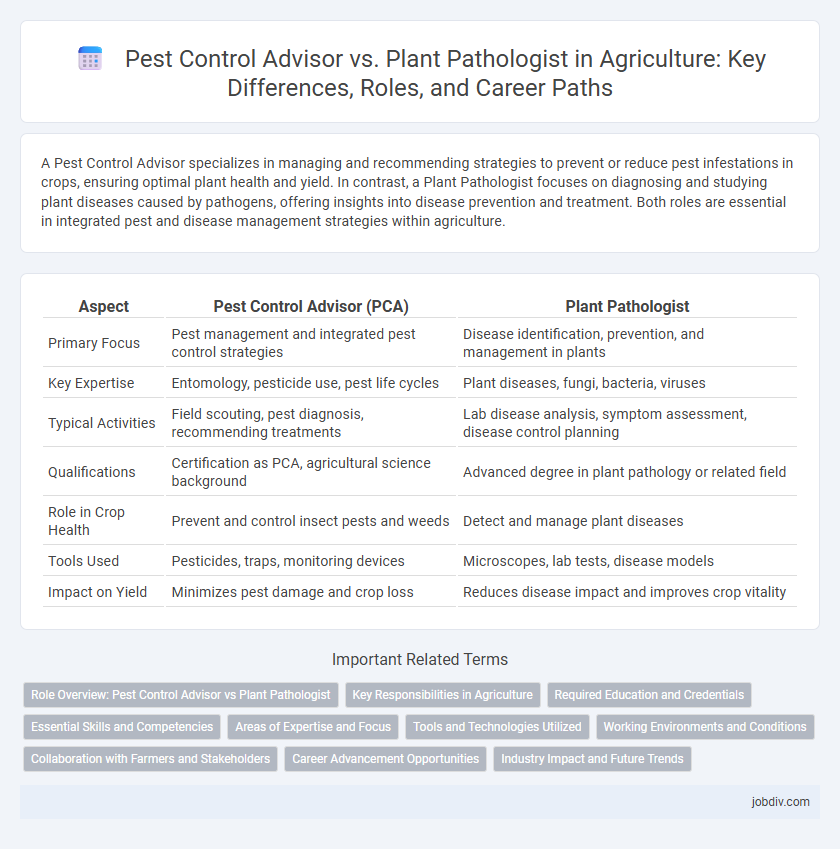A Pest Control Advisor specializes in managing and recommending strategies to prevent or reduce pest infestations in crops, ensuring optimal plant health and yield. In contrast, a Plant Pathologist focuses on diagnosing and studying plant diseases caused by pathogens, offering insights into disease prevention and treatment. Both roles are essential in integrated pest and disease management strategies within agriculture.
Table of Comparison
| Aspect | Pest Control Advisor (PCA) | Plant Pathologist |
|---|---|---|
| Primary Focus | Pest management and integrated pest control strategies | Disease identification, prevention, and management in plants |
| Key Expertise | Entomology, pesticide use, pest life cycles | Plant diseases, fungi, bacteria, viruses |
| Typical Activities | Field scouting, pest diagnosis, recommending treatments | Lab disease analysis, symptom assessment, disease control planning |
| Qualifications | Certification as PCA, agricultural science background | Advanced degree in plant pathology or related field |
| Role in Crop Health | Prevent and control insect pests and weeds | Detect and manage plant diseases |
| Tools Used | Pesticides, traps, monitoring devices | Microscopes, lab tests, disease models |
| Impact on Yield | Minimizes pest damage and crop loss | Reduces disease impact and improves crop vitality |
Role Overview: Pest Control Advisor vs Plant Pathologist
Pest Control Advisors (PCAs) focus on diagnosing pest infestations and recommending effective management strategies to protect crops and enhance yield. Plant Pathologists specialize in identifying, studying, and controlling plant diseases caused by pathogens such as fungi, bacteria, and viruses, ensuring plant health through disease prevention and treatment. Both professionals collaborate to develop integrated pest and disease management plans that optimize crop production and sustainability.
Key Responsibilities in Agriculture
Pest Control Advisors specialize in diagnosing and managing insect, weed, and disease pests affecting crop production to optimize yield and quality. Plant Pathologists focus on identifying plant diseases, understanding their causes, and developing prevention and treatment strategies to protect plant health. Both roles collaborate with farmers and agronomists to implement effective crop protection and sustainable agricultural practices.
Required Education and Credentials
Pest Control Advisors (PCAs) typically require a bachelor's degree in agricultural science, entomology, or a related field, along with state licensure to provide pesticide recommendations. Plant Pathologists usually hold advanced degrees, such as a master's or PhD in plant pathology or microbiology, focusing on diagnosing and managing plant diseases. Both professions emphasize specialized education, but PCAs focus more on pesticide application and regulation, while Plant Pathologists concentrate on disease research and diagnosis.
Essential Skills and Competencies
Pest Control Advisors excel in integrated pest management, requiring strong diagnostic skills, knowledge of pesticide application, and regulatory compliance expertise to effectively manage pest populations. Plant Pathologists specialize in identifying plant diseases, employing skills in microbiology, pathology, and laboratory analysis to develop disease prevention and control strategies. Both roles demand critical thinking, communication skills, and a deep understanding of plant health to support sustainable agricultural practices.
Areas of Expertise and Focus
Pest Control Advisors specialize in integrated pest management, focusing on the identification, monitoring, and control of insects, weeds, and diseases affecting crops to reduce economic damage. Plant Pathologists concentrate on diagnosing and studying plant diseases caused by pathogens such as fungi, bacteria, viruses, and nematodes, aiming to understand disease mechanisms and develop effective treatments. Both professionals contribute to crop health, but Pest Control Advisors prioritize practical pest management strategies while Plant Pathologists delve into the biological and molecular aspects of plant disease.
Tools and Technologies Utilized
Pest Control Advisors utilize advanced diagnostic tools such as integrated pest management software, remote sensing technology, and precision spraying equipment to monitor and manage pest populations effectively. Plant Pathologists rely on molecular diagnostics, DNA sequencing, and microscopy to identify plant diseases and study pathogen behavior at a cellular level. Both professionals incorporate Geographic Information Systems (GIS) and data analytics to optimize crop health and enhance sustainable agricultural practices.
Working Environments and Conditions
Pest Control Advisors typically work outdoors on farms or in greenhouses, assessing pest populations and recommending treatment plans under varying weather conditions. Plant Pathologists conduct research primarily in laboratories and controlled environments, analyzing plant diseases and developing management strategies in sterile, climate-controlled settings. Both roles require fieldwork, but Pest Control Advisors face more exposure to environmental elements, while Plant Pathologists benefit from more stable, indoor working conditions.
Collaboration with Farmers and Stakeholders
Pest Control Advisors (PCAs) collaborate closely with farmers to develop integrated pest management strategies, providing tailored advice on pesticide use, pest identification, and prevention methods. Plant Pathologists work alongside these advisors by diagnosing plant diseases and guiding stakeholders on disease management and resistant crop varieties. This collaboration ensures comprehensive crop health management, optimizing yield and minimizing economic losses for agricultural stakeholders.
Career Advancement Opportunities
Pest Control Advisors specialize in integrated pest management strategies, offering career advancement through certifications such as PCA licensing and roles in agricultural consulting, regulatory agencies, or corporate agronomy. Plant Pathologists focus on diagnosing and managing plant diseases, with career growth typically involving advanced degrees, research positions, and leadership in academia, government, or biotechnology firms. Both careers benefit from continuous education and expertise in sustainable agriculture techniques, but Plant Pathologists often pursue higher scientific specialization.
Industry Impact and Future Trends
Pest Control Advisors specialize in integrated pest management strategies that minimize crop losses and promote sustainable agriculture, directly impacting farm productivity and environmental health. Plant Pathologists focus on diagnosing and controlling plant diseases, crucial for preventing epidemics and ensuring crop resilience amid climate change challenges. Emerging trends emphasize biotechnology and data-driven disease monitoring, driving innovation in both fields to enhance food security and sustainable farming practices.
Pest Control Advisor vs Plant Pathologist Infographic

 jobdiv.com
jobdiv.com